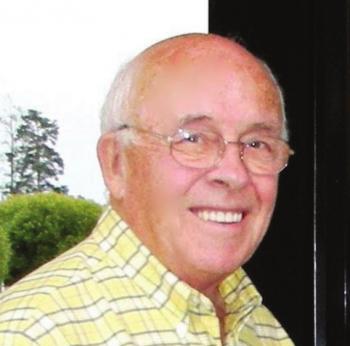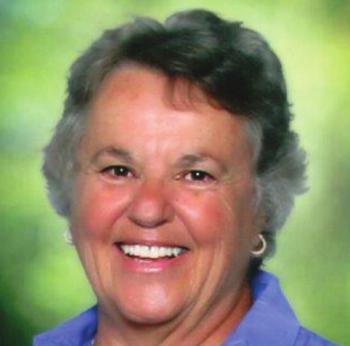5 Northern Michiganders Redefining Retirement
March 4, 2016

Whether through fundraising, advocacy, volunteerism or business development, these northern Michigan residents show retirement doesn’t mean the end of making a difference in your community.

The Fundraiser: Susie Janis
In 2014, Traverse City resident Susie Janis helped launched a new program at the Grand Traverse Regional Community Foundation. Janis recruited a group of donors who each made a three-year commitment to contribute $25,000 annually to the newlynamed Get It Done Fund. The fund would help support community projects that needed “a push” in capital to get across the finish line, including the construction of a statue honoring Traverse City founder Perry Hannah in Hannah Park and much-needed renovations at the historic City Opera House.
“There’s something about a group of members coming together and knowing you have a certain amount of money to work with and can get things done,” said Janis. “It’s working very well — and it’s proven to be a lot of fun.”
“Get It Done” might just be the defining motto of Janis’ life. A self-described homemaker who left the workforce several decades ago when she married, Janis has become key fundraiser, organizer and leader for numerous Traverse City nonprofits and causes. Janis served as board chair of the Northwestern Michigan College Foundation for six years, helping oversee a $6 million campaign to open the college’s Dennos Museum Center in 1991.
“People were saying, ‘What would they want a museum for in Traverse City?’” Janis remembered with a laugh. “Now look at how busy it is there. That’s been very rewarding.”
Janis also chaired the Grand Traverse Pavilions Foundation Board and Traverse Symphony Friends board, and served as the first female director of the Traverse City Area Chamber of Commerce. She was instrumental in the funding and development of the Smith Family Breast Health Center at Munson Medical Center and earned key appointments on several state boards, including the Michigan Community Economic Excellence Board, Michigan Humanities Council and Michigan’s Bureau of History.
Though Janis is appreciative of the accolades she’s received for her contributions — last year she earned the Chamber’s Distinguished Service Award and, in 2007, she was named Michigan’s Volunteer of the Year — she says the relationships and sense of purpose she’s found have been her greatest rewards.
“It wasn’t for the glory or someone patting me on the back,” she said. “I had the time; I wanted to do something and, honestly, it filled a hole. I had a purpose to get dressed and go out every day and I realized, ‘Boy, there are a lot of places I can meet new people and work on things that can make a difference.’ I think it keeps you younger, I really do.”
Janis notes the abundance of volunteer opportunities in every community and encourages retirees and seniors — as well as other individuals with extra time to give — to get involved in causes they’re passionate about.
“Even if it’s just a few hours a week, that’s huge,” she said, “especially in a community like ours.”

The Historian: Cliff “Top” Sjogren
At 87 years old, Cliff Sjogren — Top, as he’s called by everyone in Cadillac — is still an active presence in his hometown.
“I’m still downhill skiing, though not the black diamonds anymore,” he said with a chuckle. “I’m still riding my bike around the lake every summer. So it seems I’ll still be around a few more weeks, anyway.”
That’s welcome news to the many residents and community leaders who hail Sjogren as an “author, historian and a gem,” in the words of Cadillac Area Chamber of Commerce Leadership Director Deb Gillies.
After a long and illustrious career traveling the globe as a leader in post-secondary education — including 15 years as director of admissions at the University of Michigan and four years in the same position at the University of Southern California — Sjogren retired to northern Michigan in 1993.
Sjogren used some of his early retirement years to help champion International Baccalaureate schools, an education movement he’s been involved with since 1972.
After he stepped down from these duties, he turned his attention to projects within his own backyard of Cadillac.
“I came into the [Wexford County Historical Society & Museum] a few years after I got back to town,” Sjogren said. “I saw all these old photos sitting on a table in the sunlight. I had served in the U.S. Navy as an aerial photographer and I knew the sunlight wasn’t good for those pictures. I told a woman there the photos needed to be scanned and catalogued and stored. She asked if I’d want to do that. I said sure and she said, ‘Okay, you’re on the board.’” Sjogren proceeded to spend “literally thousands of hours” as a volunteer digitizing the museum’s photograph collection. He carefully researched the town’s history to caption the photos and helped build a museum website to make them available online.
“We’ve now had 330,000 hits on the website,” Sjogren said. “A lot of businesses use the photos in town. People have found their grandparents and great-grandparents online and downloaded the pictures to put in frames. People are just delighted with it.”
In the process of researching Cadillac’s history, Sjogren became enamored with the colorful stories he encountered about the town’s early pioneers.
“We had almost nothing here in Cadillac on our history in terms of books; the last ones were in the early 1900s,” he said. So, using his own money to fund the project, Sjogren gathered the community’s settlement stories and accompanying photographs into a book called “Timber Town Tales: Stories and Images of Early Cadillac, Michigan.” He donated all of the book’s proceeds to the museum.
“We’ve sold about 1,000 copies so far, so the book has generated $12,000 for the museum,” Sjogren said.
The “de facto town historian” has also given more than 50 presentations to community groups about Cadillac’s unique history as a logging town. And he doesn’t plan to stop there. Sjogren is in the process of publishing his second book, “Child of the Great Depression: Growing Up in Cadillac, Michigan During a Troubled Time,” a memoir of his northern Michigan childhood and career. He also plans to donate the proceeds of that book to the museum.

The Advocate: Janet Mancinelli
Petoskey resident Janet Mancinelli has been blessed with a clarity of purpose not everyone gets to experience in their careers.
“The work [I did] was my career passion, which was working for social equality and changing a system that discriminates against women and girls,” she said.
For almost 37 years, Mancinelli pursued that goal as executive director of the Women’s Resource Center (WRC) of Northern Michigan. When she started in the fall of 1978, the agency had a staff of three and an annual budget of $40,000.
“It was the year domestic violence legislation had passed in Michigan…so literally, it only became illegal to batter your wife that year,” she said. “Our goal was to change how the systems — the courts, the criminal justice and the medical systems — looked at, and dealt with, issues of violence against women and children.”
Over the next three decades, Mancinelli partnered with other community social service and health organizations to build a network of services designed to empower women.
When Mancinelli made the decision to retire in 2015, WRC had grown to a staff of 53 and a $2.7 million annual budget.
“I had accomplished so many of the things I set out to do,” said Mancinelli, who is 64. “I wanted to retire and have enough health and energy to do the things I really wanted to before I got too old.”
Befitting someone whose career has been spent advocating for others, Mancinelli’s retirement hasn’t slowed her down. She serves on the board of directors for the Petoskey Regional Chamber of Commerce and is a member of Resort Township’s planning commission. She’s also actively engaged in Zonta, of which she’s been a member since 1982 and for which she served as club president from 2010–2012.
Mancinelli also works with the Hestia Women’s Giving Circle, a group of women from Charlevoix and Emmet counties whose mission is to “promote the economic self-sufficiency and well-being of women and girls.” She contracts part time for the state of Michigan on issues regarding violence against women.
An avid sailor, Mancinelli sits on the board of Little Traverse Sailors — a nonprofit that teaches children how to sail — and donates sailing excursions with Captain Jan for fundraising auctions, such as an upcoming WRC event this month.
“For me, a rich life is an involved life,” Mancinelli said. “I’ve always had a rich life and I want to continue that as long as I have the ability to do so. As long as I still have something of value to offer, I want to offer that.”

The Fixer: Tom Menzel
Tom Menzel hasn’t officially retired yet — though, at 71, he’s certainly of age to do so. Instead, the veteran leader of both private and public sector organizations has twice postponed plans to leave the workforce in order to take on “one last job,” turning around key community groups facing financial distress.
“I keep working, even though I keep saying it’s my last one,” Menzel chuckled. Following a lengthy career in business and politics — in which Menzel served as the mayor, city treasurer and alderman of Chicago-area suburb Rolling Meadows, held key management positions for Xerox Corporation and McGraw-Hill, and worked in national public affairs for Allstate Insurance — Menzel set up shop full time in Traverse City.
In 2005, he took over as executive director for the National Cherry Festival. Over the next three years, Menzel helped pull the festival back from the brink of bankruptcy. “I don’t think there was an awareness among some about the serious financial trouble at the time,” he said. “I was brought in as a change agent.”
Menzel realized his goal of setting the organization on a path to fiscal success in 2008, when the Cherry Festival “turned the corner” and posted its first profit in five years.
With that mission accomplished, Menzel began making plans for retirement.
“I was ready to quit after the Cherry Festival and my Aunt Marjorie — who was 104 — said, ‘What are you doing?’” Menzel said. “I said, ‘Well, I’m 64; I’m going to retire.’ And she said, ‘Retire? I worked until I was 85. You go get a job.’” He wound up doing exactly that. At the time, the Bay Area Transportation Authority (BATA) was $400,000 in debt. They were hemorrhaging funds and had been operating without an executive director for more than a year. The opportunity to make a difference in another key community organization was too much for Menzel to pass up.
“It was an organization at risk, very much like the Cherry Festival,” said Menzel. “Not many people like to go into those situations, but I liked the challenge of it. I felt I could add some value.”
Over the next six years, Menzel orchestrated a dramatic turnaround at BATA, eliminating its debt, doubling BATA’s asset base with more than $7 million in grant funding and investments, replacing 70 percent of the company’s aging fleet and introducing new technology and programs, like BATA’s Loop and Link route model. When he announced his retirement last March, Menzel was ready to leave the 9–5 working world on a high note.
Yet, one more opportunity came calling. Grand Traverse County Commissioner Dan Lathrop, who also served on the BATA board, lobbied Menzel to help the county address its financial and staffing challenges, which included an exodus of county department heads, a structural deficit of several million dollars and close to $50 million in unfunded pension liabilities. Though he initially agreed to help as a volunteer contractor, Menzel ultimately was offered — and agreed to take — the full-time position of county administrator in November.
Now in the midst of the “tough budget cuts” and organizational restructuring Menzel believes is necessary to turn Grand Traverse County around, he’s also focused on developing “bench strength” to lead the county when he leaves.
“That’s your legacy,” he said. “You want to develop young people and you want to develop healthy work environments.”
And while Menzel says retirement may finally be waiting for him in a few years, his experience so far has taught him to “never say never.”
“Part of a healthy profile for me is stay engaged and invested as long as I can,” Menzel said. “I’m a lifelong learner, so I keep things open and don’t say no to anything. If you can bring your skill sets and relationships to different cultures, you’ll keep giving yourself interesting opportunities in life.”
Trending

The Valleys and Hills of Doon Brae
Whether you’re a single-digit handicap or a duffer who doesn’t know a mashie from a niblick, there’s a n... Read More >>
The Garden Theater’s Green Energy Roof
In 2018, Garden Theater owners Rick and Jennie Schmitt and Blake and Marci Brooks looked into installing solar panels on t... Read More >>
Earth Day Up North
Happy Earth Day! If you want to celebrate our favorite planet, here are a few activities happening around the North. On Ap... Read More >>


